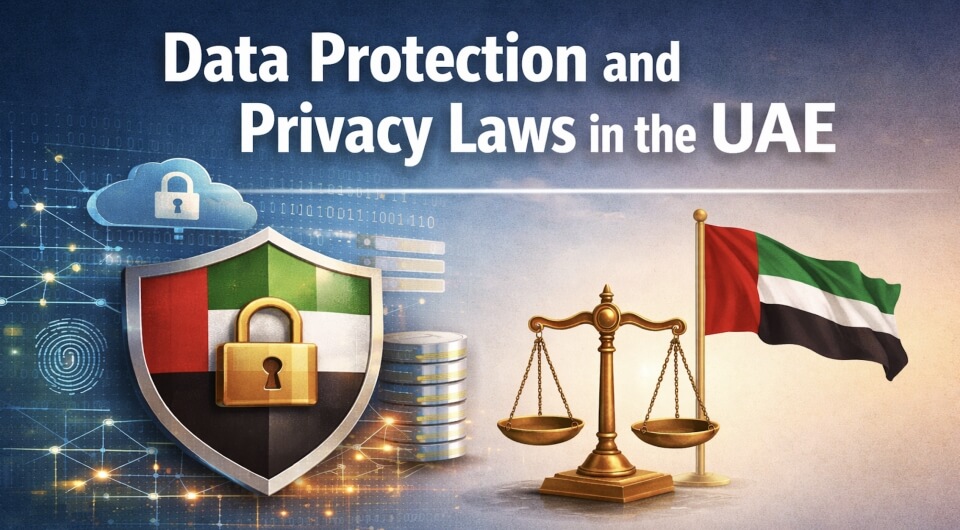Legal blog
The New Law of E-commerce in the UAE

Forward
As the concept of international commerce has shifted globally in terms of electronic transactions, the new e-commerce law has been introduced to match this progress. The complexities of such transactions in terms of trust and proof have made it necessary to keep up with the digital relationship and legality of all those involved in the process. In pursuit of this objective, Federal Decree-Law No. (46) of 2021 regarding Electronic Transactions and Trust Services (“ETTS” or “Decree-Law”) was promulgated on September 20, 2021, and subsequently came into force in January 2022. The primary objective of the Decree-Law is to enhance confidence, encourage, and simplify electronic transactions in many categories while preserving the rights of customers.
Two years later, the Cabinet Resolution No. (28) of 2023, pertaining to the Executive Regulations of Federal Decree-Law No. (46) of 2021 on Electronic Transactions and Trust Services (“Executive Regulations”), was enacted. This resolution aims to address any existing gaps and comprehensively outline the details referenced in the original Decree-Law.
The New E-commerce Law. What is New?
The e-commerce landscape in the United Arab Emirates (UAE) has undergone significant and remarkable progress over an extended period. This transformation has been propelled by substantial investments, strategic acquisitions, and collaborative ventures with global entities. A pivotal factor contributing to this evolution lies in the concerted efforts directed toward the enhancement and modernization of payment methodologies and procedures. The recognition of this pivotal aspect underscores its substantial impact on the stimulation and facilitation of purchasing and trading activities within the burgeoning e-commerce market of the UAE.
The initiation of the e-commerce legal reform commenced with the enactment of the Decree-Law, a decade, and a half subsequent to the enforcement of Federal Law No. (1) of 2006 on Electronic Commerce and Transactions. This step intends to regulate electronic transactions and set the guidelines for licensing, order & delivery, e-signature, e-time, document saving, and all that’s required to provide a secure process while safeguarding the entitlements of online consumers.
With the technological advancement and major contribution of mobile devices to perform commercial transactions, it has become inevitable to respond to the progress by introducing the Decree-Law and setting the base for businesses to settle their status. The Executive Regulations came afterward to set the framework to put these regulations in force to provide the maximum level of security and combat piracy and scams.
Here are some of the key changes brought forward by the New E-commerce Law:
- The Telecommunications and Digital Government Regulatory Authority (“TDRA”) has been established as the regulatory authority for E-commerce activities. Trust Service Providers must obtain a license from TDRA before offering services to third parties, with TDRA publicly disclosing this “Trust List” of approved licensees and their authorized services.
- While TDRA serves as the primary regulator by the Law, the Federal Authority for Identity and Citizenship issues controls in two specific cases: for trust services or qualified trust services provided to the governmental sector, and for trust services or qualified trust services that depend on the information or services of the Federal Authority for Identity and Citizenship.
- Transactions shall no longer lose their validity or enforceability, and their admissibility as evidence shall not be precluded merely because they are in electronic form. Additionally, the validity and enforceability of the contract remain unaffected solely on the basis that it was formulated through one or more Electronic Documents.
- The New E-commerce Law stresses that electronic signatures are treated the same as handwritten signatures and makes a distinction of three types: electronic signatures, qualified electronic signatures, and approved electronic signatures. Each of these types has a different level of validity.
- A person with a valid digital ID according to TDRA can use any electronic signature to conclude transactions with government entities and access their services, while it was among the exceptions in the old law.
- The newly enacted E-commerce Law affords Qualified Trust Service Providers the privilege of extending their services beyond the borders of the UAE, under the condition that the quality of these services aligns with the standards maintained within the UAE in accordance with the Decree-Law. This provision aims to facilitate and encourage cross-border electronic transactions.
- The new E-commerce Law imposes heightened responsibilities on the E-signatory and Digital ID Holder, necessitating a more rigorous exercise of due diligence to prevent any unauthorized use of the E-signature/seal, authentication certificates, or digital ID. This marks a departure from the previous legal standard of “reasonable care” to a more stringent requirement.
- After the penalties for violating the law by “knowingly originating” an E-transaction/seal with false information electronic authentication or incorrect data and disclosure of confidential information, the new Decree-Law explicitly stipulated the sanctions for the “forgery” of an E-transaction/seal and increased the amount of the fines applied and kept the imprisonment but with specifying its term.
- Last but not least, the Federal Decree-Law made the necessary changes and gave the stakeholders a grace period of 12 months after it was published to settle their status to check compliance while monitoring and observing the transition to make sure all the necessary details are covered in the supplementing Executive Regulations that came after almost two years to fully regulate the sector.
What Are Electronic Transactions and Trust Services?
In order to know the scope of the e-commerce law, we must refer to the definitions thereof. Electronic transactions encompass a diverse range of digital engagements, including contracts, offers, quotations, payment orders, bills, and other instruments executed in whole or in part in electronic form.
Trust services go beyond the creation of electronic signatures, extending to the authentication and verification of digital identities, ensuring the security and integrity of electronic documents and communications. In the dynamic digital landscape, these services play a crucial role in fostering reliability and trust in electronic transactions by facilitating secure and authenticated interactions for e-commerce.
These activities are governed by the e-commerce law, which oversees the licensing of Trust Service Providers and establishes criteria for the approval and maintenance of electronic records, marks, and seals. Recent studies indicate a notable trend wherein online shoppers exhibit greater comfort in purchasing from UAE-based retail websites and platforms compared to foreign counterparts.
This attests to the elevated levels of confidence and accountability instilled by the robust UAE legislative system, further emphasizing the effectiveness of its regulatory framework in fostering a secure and trustworthy environment for digital transactions.
The legislative emphasis on ensuring compliance and transparency contributes to the heightened consumer trust, positioning the UAE as a favorable and reliable destination for online commerce. To emphasize, the development of such a Decree-Law has only pushed for the growth and security of e-commerce in the UAE.
Whom Does the New E-commerce Law Apply to?
The term E-commerce implies the inclusion of individuals, whether natural or corporate, engaged in commercial activities and trade. In the traditional realm of commerce, such individuals are obligated to adhere to relevant laws for commencing trading operations. This entails obtaining licenses, establishing office spaces, securing capital, maintaining records, and appointing a manager and signatory responsible for overseeing and authorizing business operations.
Expanding upon the electronic dimension, individuals engaged in electronic commerce through websites, platforms, or mobile applications, with the intention of selling goods or services for profit, are obligated to adhere to the regulations outlined in the New E-commerce Law.
Beyond acquiring a domain name or incorporating a payment gateway, obtaining licensing from the Telecommunications and Digital Government Regulatory Authority (TDRA) entails compliance with a comprehensive regulatory framework. This framework imposes essential obligations that retailers must meet to conduct online business operations, ensuring a structured and legally compliant electronic commerce environment.
What You Need to Know About the E-commerce Law Before Doing Business
With the surge in electronic transactions and the paramount goal of fostering trust among online consumers while combating scams and piracy, the Decree-Law and its corresponding Executive Regulations have been instituted to comprehensively regulate the entire E-commerce sector in the UAE.
In addition to the obligatory commercial license encompassing e-commerce activities, the Telecommunications and Digital Government Regulatory Authority (TDRA) assumes a pivotal role in issuing, renewing, amending, and revoking licenses for retailers. This process involves a thorough evaluation of licensees' adherence to stipulated rules, standards, and requirements established in collaboration with government entities responsible for data protection and cybersecurity, as delineated in Article (4) of the Decree-Law.
E-commerce suppliers operating within the UAE are mandated to furnish prescribed information for listed goods, ensuring compliance with relevant laws and regulations. These suppliers bear liability for any defects in products sold on their platforms, introducing an added layer of compliance and heightened responsibility.
The Executive Regulations, effective as of June 29, 2023, delineate the licensing procedures for retailers and establish standards for validating electronic documents, signatures, and seals. Furthermore, TDRA is empowered to publish and update the “Trust List” post-license issuance, identifying Trust Service Providers and Qualified Trust Service Providers along with their respective services.
Article (15) of the Executive Regulations outlines the licensee’s obligations, emphasizing the provision of accurate information upon TDRA’s request, communication of service usage restrictions to users, and the inclusion of clear and easily accessible Terms and Conditions. These conditions elucidate aspects such as delivery, refund, and exchange policies, responsibilities, payment requirements, and more.
Recognizing the sensitive nature of personal information involved in e-transactions, retailers must publish their privacy policy and pledge to implement technical and regulatory measures to comply with pertinent laws safeguarding user information. TDRA retains the authority to revoke the license of any Trust Service Provider found non-compliant with the Executive Regulations concerning electronic contracts.
As the paradigm of accepting contracts electronically evolves from traditional signatures, seals, and dates to a simplified click for consent, the Executive Regulations meticulously detail the requirements for trust service providers from Article (19) to Article (32). These measures are instituted to safeguard both customers and retailers, mitigating potential claims of uninformed contract terms or limitations.
What are the Penalties to Know for Forgery and Misuse of Trust Services
According to the law, individuals involved in the forgery of electronic documents, signatures, stamps, or trust services face legal consequences, including imprisonment and/or fines starting at AED 100,000. In cases where the forgery involves a public or governmental authority, the minimum fine escalates to AED 150,000.
The legislation also outlines penalties for the exploitation of trust services, unauthorized disclosure of confidential information, and the intentional submission of incorrect data for issuing or canceling authentication certificates.
Other Laws Related to the E-commerce Activity
Notwithstanding, that while the central emphasis of this article is to explore the New E-commerce Law through the Decree-Law and Executive Regulations as they outline the rules and regulations for the stakeholders of the e-commerce sector, it is beneficial to furnish herein an additional compilation of additional legislations pertinent to conducting online business:
-
Federal Law No. 15/2020 on Consumer Protection and Cabinet Resolution No. 12/2007 (Consumer Protection Law).
-
Federal Decree Law No. 45/2021 regarding the Protection of Personal Data (PDPL).
-
Federal Decree-Law No. 34/2021 concerning the Fight Against Rumors and Cybercrime (Cybercrime Law).
-
Federal Decree-Law No. 38/2021 on Copyrights and Neighboring Rights and its Implementing Regulations (Copyrights Law).
These regulations and stipulations are enforceable in accordance with the jurisdiction wherein the e-commerce business is established, alongside adherence to other formal prerequisites.
Conclusion
The enactment of the Decree-Law marks a significant stride as it supersedes and replaces Federal Law No. (1) of 2006 on Electronic Commerce and Transactions. This legislative evolution is a response to the imperative of aligning with the remarkable expansion of the e-commerce sector, reflecting the UAE government's proactive engagement in the technological revolution.
Over the past decade, there has been a notable surge in online transactions conducted through mobile devices, necessitating a contemporary legal framework to accommodate and regulate this burgeoning trend.
In anticipating the dynamic trajectory of technological advancements, it is crucial to acknowledge the inherent unpredictability of future technologies. Consequently, there is a need for legislation that remains adaptable and relevant to the evolving landscape of the e-commerce sector over the years to come. The UAE, in its commitment to remaining at the forefront of economic and social progress, exemplifies a pioneering stance among regional nations.
By continually assessing and responding to the changing dynamics of the digital landscape, the UAE sets noteworthy milestones to sustain its leadership position in the realms of commerce and technology. This forward-thinking approach positions the country as a trailblazer, setting benchmarks for others to emulate and reinforcing its commitment to fostering a conducive environment for innovation and economic advancement.
Seeking Assistance
Connect with legal professionals specializing in Digital and data regulatory matters for comprehensive guidance on legal issues pertaining to electronic transactions and digital transformation.
Special thanks to:
Suhail Rana | Ibrahim Al Banna Advocates & Legal Consultants
for his help in writing the article.

This publication is for general information purposes only. It does not purport to provide comprehensive full legal or other advice.
Legal Advice Middle East and the contributors accept no responsibility for losses that may arise from reliance upon information contained in this publication. This publication is intended to give an indication of legal issues upon which you may need advice.
Full legal advice should be taken in due course from a qualified professional when dealing with specific situations.











